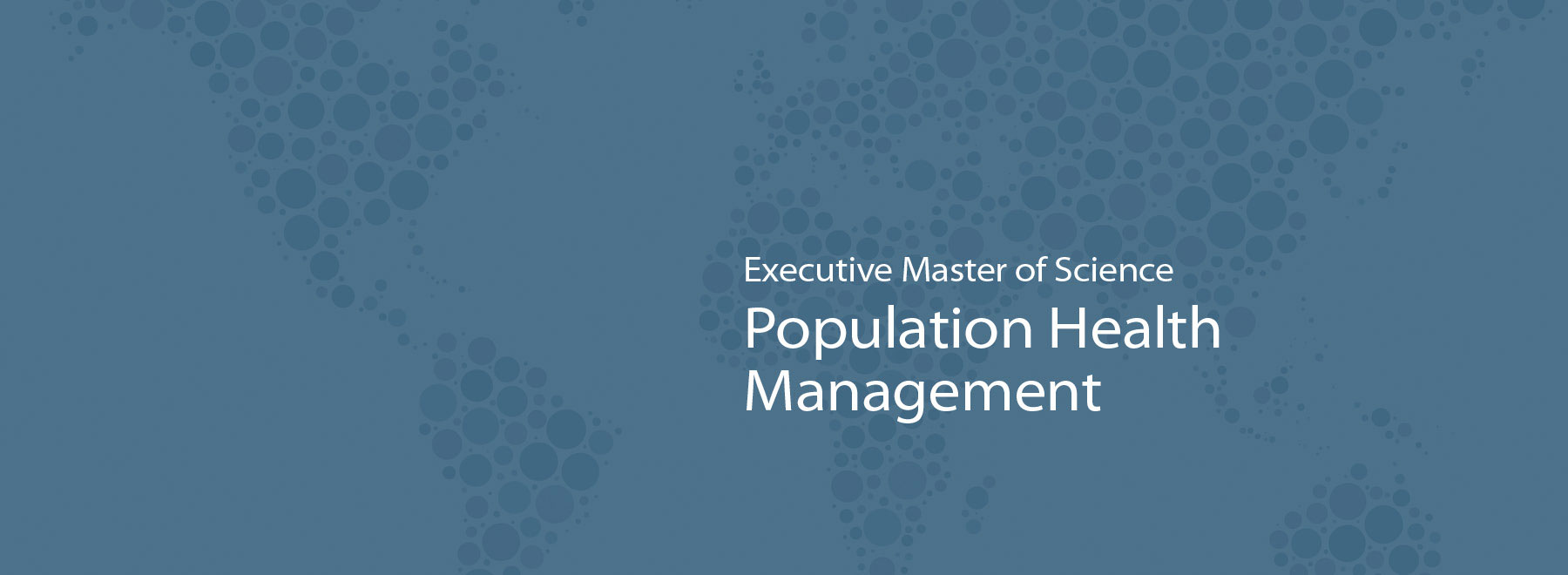
- SoPH
- Faculty and Departments
- Population Health Science
- Education
- Executive MS - Population Health Management
Executive MS - Population Health Management
- Population Health Science Home
- About Us
- Education
- Research
- Resources
Course Descriptions
All courses in the Executive Master of Science in Population Health Management program are delivered online.
PHS 700. Essentials of Population Health Science. Introduction to how the multiple determinants of health (e.g., health care, socioeconomic status, genetics, the physical environment, and health behavior, and their interactions) have implications for the health outcomes of populations. Characteristics of populations defined by geography, diagnosis, and/or point of care will be discussed. Avenues in which health care systems, public health agencies, community-based organizations, and retail health organizations work together to improve local, national, and global communities. Students will also learn how to view problems from a population health and population health management perspective. Descriptions of how clinical and non-clinical data are used to measure health-related outcomes, analyze patterns, communicate results, and develop evidence-based intervention practices to manage the health of populations will be explored. Traditional Lecture (3 hours)
PHS 703. Epidemiology I. This course will introduce students to the principles and methods of epidemiology in human populations, including study design (randomized trials, case-control studies, cohort studies, and cross-sectional studies), risk estimation, and methods of causal inference. Online, Internet, or Web-based Lecture (3 hours)
PHS 705. Value-based Healthcare Del & Pay Models. Health care systems in the US and around the world are pursuing value-based health care (VBHC) reforms that seek to achieve the triple aim of better care for individuals, better health for populations, and lower cost of care per capita. In VBHC, health care payers and purchasers hold health care providers accountable for delivering high-quality care and spending health care dollars more wisely. VBHC delivery models include Accountable Care Organizations (ACOs) and non-ACO models. ACOs are networks of hospitals, doctors, and other health care providers that share financial and clinical responsibility for providing coordinated care to patient populations in hopes of limiting unnecessary spending. Both ACO and non-ACO value-based payment models will be covered in this course. Traditional Lecture (3 hours)
- PHS 709. Population Health Management. This course will introduce students to the applied field of population health management through the use of case studies and key elements of population health management such as development of accountable care processes and infrastructure, payer relationships, care coordination, health and financial management systems, and leadership. Descriptions of how clinical and non-clinical evidence is used to measure health-related outcomes, analyze patterns, communicate results, and identify best practices and implement effective interventions to manage the health of clinical populations. The importance and challenges of the translation of data and information into intelligence for clinical and health policy decision-making will be emphasized. Online, Internet, or Web-based Lecture (3 hours)
PHS 710. Lifestyle Medicine and Health Coaching. The purpose of this course is to increase the knowledge and skills of clinicians in coaching patients to make lasting lifestyle management changes utilizing evidence-based lifestyle medicine strategies. It is envisaged that undertaking this subject will contribute to the professional development, knowledge base, and performance of those involved in health promotion and chronic disease management. Given the evolution of the U.S. health care system, health care providers are incentivized to produce better patient outcomes and to reduce recurring patient visits. Employers are prioritizing health and wellness in the workplace, aiming to cut costs and increase productivity. Given these changes, it is important for clinicians to increase their skill set in the provision of lifestyle modifications, as well as enhance their knowledge of evidence-based approaches for motivating behavior change, and understanding of how to incorporate lifestyle medicine into clinical practice. Online Lecture (3 hours)
PHS 711. Healthcare Quality and Safety. This course provides an overview of health care quality and safety. Students will learn fundamental quality improvement concepts and techniques. Quality measurement, assessment, and improvement frameworks will be explored as they apply to clinical, safety, and patient satisfaction outcomes. Traditional Lecture (3 hours)
- PHS 720. Population Health Informatics. This course will focus on the concepts, theories, and practices of the evolving discipline of health informatics. Differentiation between approaches used in this field versus health information technology will be highlighted. Health informatics is defined as the method of acquiring, storing, retrieving, and using healthcare information to foster better collaboration among patients and health care providers. This evolving specialization links information technology, communication, and health care to improve the quality and safety of patient care. Online, Internet, or Web-based Lecture (3 hours)
PHS 731. Social Determinants of Health. This course analyzes the social factors, such as inequalities in income and opportunities, and racial/ethnic disparities that influence the health of populations. The course examines the effect of economic, social, cultural, and environmental factors on population health. The course looks at how systematic variation in these factors leads to health disparities, and explores how economic, social, and cultural conditions interact with other determinants of health such as human behavior and biology. The course also reviews the methods used in health disparities research and assesses relevant economic and social policies. Online, Internet, or Web-based Lecture (3 hours)
- PHS 797. Population Health Capstone. This course will entail developing and implementing a project to address one or more dimensions of the Quadruple Aim, i.e., improve the patient experience, improve health outcomes, improve the provider experience, or reduce health care costs, in a specified setting. (6 hours)
PHS-approved electives course descriptions may be found in the current version of the UMMC Catalog.


